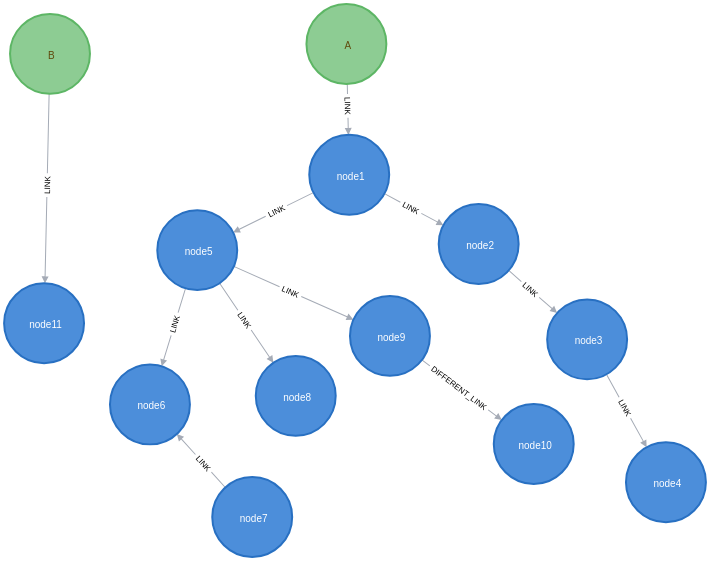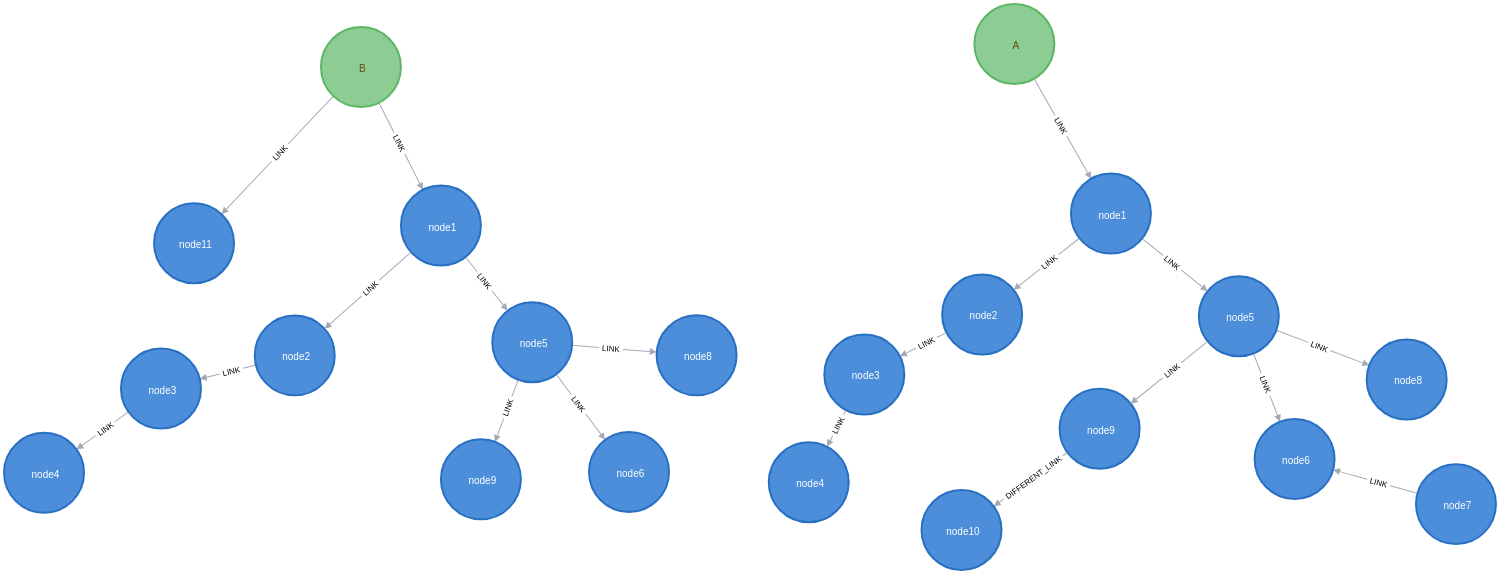Clone subgraph
These procedures can be used to clone a subgraph defined either by a list of nodes and a list of relationships, or a list of paths. This is useful when you want to ensure the cloned subgraph isn’t connected to the original nodes, or to nodes outside the subgraph.
If relationships are not provided, all relationships between the given nodes will be cloned.
In the config map, we can supply a standinNodes list (of pairs of nodes), allowing an existing node in the graph to act as a standin for another node in the cloned subgraph.
This can be useful when you want to attach the cloned subgraph to another node in your graph (in place of cloning a node).
The available procedures are described in the table below:
|
clone nodes with their labels and properties (optionally skipping any properties in the skipProperties list via the config map), and clone the given relationships (will exist between cloned nodes only). If no relationships are provided, all relationships between the given nodes will be cloned. Relationships can be optionally redirected according to standinNodes node pairings (this is a list of list-pairs of nodes), so given a node in the original subgraph (first of the pair), an existing node (second of the pair) can act as a standin for it within the cloned subgraph. Cloned relationships will be redirected to the standin. |
|
from the subgraph formed from the given paths, clone nodes with their labels and properties (optionally skipping any properties in the skipProperties list via the config map), and clone the relationships (will exist between cloned nodes only). Relationships can be redirected according to optional standinNodes node pairings (this is a list of list-pairs of nodes), so given a node in the original subgraph (first of the pair), an existing node (second of the pair) can act as a standin for it within the cloned subgraph. Cloned relationships will be redirected to the standin. |
Example Usage
The examples below will help us learn how to use these procedures.
Cloning a tree from one root to another
CREATE (rootA:Root{name:'A'}),
(rootB:Root{name:'B'}),
(n1:Node{name:'node1', id:1}),
(n2:Node{name:'node2', id:2}),
(n3:Node{name:'node3', id:3}),
(n4:Node{name:'node4', id:4}),
(n5:Node{name:'node5', id:5}),
(n6:Node{name:'node6', id:6}),
(n7:Node{name:'node7', id:7}),
(n8:Node{name:'node8', id:8}),
(n9:Node{name:'node9', id:9}),
(n10:Node{name:'node10', id:10}),
(n11:Node{name:'node11', id:11}),
(n12:Node{name:'node12', id:12})
CREATE (rootA)-[:LINK]->(n1)-[:LINK]->(n2)-[:LINK]->(n3)-[:LINK]->(n4)
CREATE (n1)-[:LINK]->(n5)-[:LINK]->(n6)<-[:LINK]-(n7)
CREATE (n5)-[:LINK]->(n8)
CREATE (n5)-[:LINK]->(n9)-[:DIFFERENT_LINK]->(n10)
CREATE (rootB)-[:LINK]->(n11)
:LINK relationships, and attaches that subgraph to rootB. rootB acts as a standin for rootA, which is not cloned:MATCH (rootA:Root{name:'A'}),
(rootB:Root{name:'B'})
MATCH path = (rootA)-[:LINK*]->(node)
WITH rootA, rootB, collect(path) as paths
CALL apoc.refactor.cloneSubgraphFromPaths(paths, {
standinNodes:[[rootA, rootB]]
})
YIELD input, output, error
RETURN input, output, errorIf we execute this query, it will result in the following graph:

Another approach is to use apoc.refactor.cloneSubgraph(), providing the lists of nodes and relationships which form the subgraph.
We can get the nodes and rels from the yielded output of apoc.path.subgraphAll(), filtering to the relationship types in the call to that procedure.
CREATE (rootA:Root2{name:'A'}),
(rootB:Root2{name:'B'}),
(n1:Node2{name:'node1', id:1}),
(n2:Node2{name:'node2', id:2}),
(n3:Node2{name:'node3', id:3}),
(n4:Node2{name:'node4', id:4}),
(n5:Node2{name:'node5', id:5}),
(n6:Node2{name:'node6', id:6}),
(n7:Node2{name:'node7', id:7}),
(n8:Node2{name:'node8', id:8}),
(n9:Node2{name:'node9', id:9}),
(n10:Node2{name:'node10', id:10}),
(n11:Node2{name:'node11', id:11}),
(n12:Node2{name:'node12', id:12})
CREATE (rootA)-[:LINK]->(n1)-[:LINK]->(n2)-[:LINK]->(n3)-[:LINK]->(n4)
CREATE (n1)-[:LINK]->(n5)-[:LINK]->(n6)<-[:LINK]-(n7)
CREATE (n5)-[:LINK]->(n8)
CREATE (n5)-[:LINK]->(n9)-[:DIFFERENT_LINK]->(n10)
CREATE (rootB)-[:LINK]->(n11):LINK relationships, and attaches that subgraph to rootB. rootB acts as a standin for rootA, which is not cloned:MATCH (rootA:Root2{name:'A'}),
(rootB:Root2{name:'B'})
CALL apoc.path.subgraphAll(rootA, {relationshipFilter:'LINK>'})
YIELD nodes, relationships
CALL apoc.refactor.cloneSubgraph(
nodes,
[rel in relationships WHERE type(rel) = 'LINK'],
{ standinNodes:[[rootA, rootB]] })
YIELD input, output, error
RETURN input, output, errorThe resulting graph will be the same as our earlier apoc.refactor.cloneSubgraphFromPaths() call.